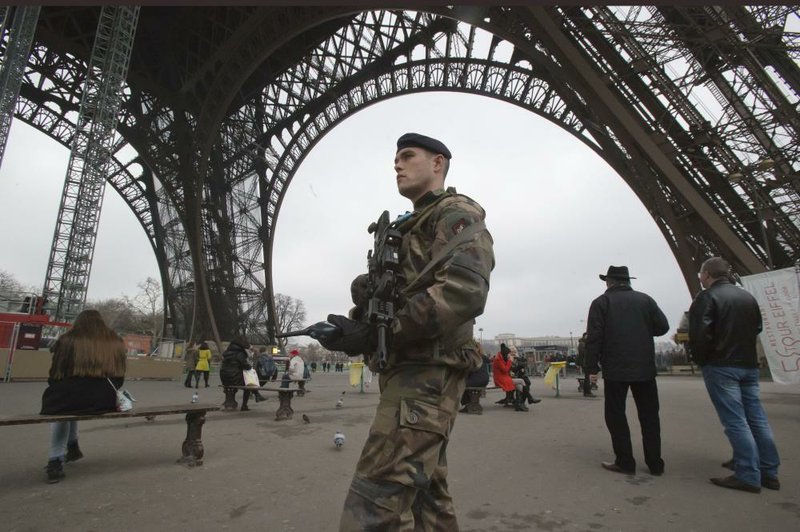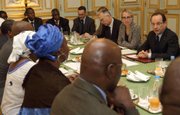BAMAKO, Mali — French fighter jets bombed rebel targets in a major city in Mali’s north Sunday, pounding the airport as well as training camps, warehouses and buildings used by the al-Qaida-linked Islamists controlling the area, officials and residents said.
Now in its third-day, the French-led effort to take back Mali’s north from the extremists began with airstrikes by combat helicopters in the small town of Konna. It has grown to a coordinated attack by state-of-the-art fighter jets, which have bombarded at least five towns. Gao, which was attacked Sunday afternoon, is the largest among those hit.
More than 400 French troops have been deployed to the country in the all-out effort to win back the territory from the well-armed rebels, who seized control of an area larger than France nine months ago. What began as a French offensive has now grown to include seven other countries, including logistical support from the U.S. and Europe. The United States is providing communications and transport help, while Britain is sending C-17 cargo aircrafts to help Mali’s allies transport troops to the front lines.
RELATED ARTICLE
http://www.arkansas…">Witnesses describe failed Somalia raid
French President Francois Hollande authorized the intervention after it became clear the swiftly advancing rebels could break Mali’s military defenses in Mopti, the first town on the government-controlled side, located in the center of this African country. The move catapulted the world into a fight that diplomats had earlier said would not take place until at least September.
“French fighter jets have identified and destroyed this Sunday, Jan. 13, numerous targets in northern Mali near Gao, in particular training camps, infrastructure and logistical depots which served as bases for terrorist groups,” the French Defense Ministry said in a statement.
France said it’s sending more jet fighters to northern Mali and will continue until the rebel forces are “eradicated.”
“Raids are continuing right now,” French Defense Minister Jean-Yves Le Drian said Sunday on Europe 1 radio. “There were raids last night; there will be more this afternoon and tomorrow.”
French officials have acknowledged that the rebels are better armed than they expected, and one of the first fatalities was a 41-year-old French pilot, whose helicopter was downed by rebel fire near the town of Konna.
The Islamists, including three separate rebel groups, all of which have either direct or indirect ties to al-Qaida, are armed with weapons stolen from the abandoned arsenal of ex-Libyan leader Moammar Gadhafi. They are also in possession of the weapons left behind by Mali’s army, which abandoned the north in the face of the rebel advance last April. The fighters managed to seize the territory in the north after a military coup led to political turmoil in the once-stable nation of 15.8 million last March.
A French presidential aide who was not authorized to be publicly named said that the insurgents are “well-equipped, well-armed and well-trained,” and are using high-end equipment. “They obtained from Libya modern, sophisticated equipment, much stronger and more efficient than we had imagined,” he said.
One of the commanders controlling Gao confirmed that the French had flattened a building at the northern entrance to the town used by his fighters as a checkpoint and that three of his men died, crushed under the structure’s falling roof. Oumar Ould Hamaha further confirmed that fighter jets had hit training camps and depots.
He egged on the French, calling them cowards and saying that their attack has only heightened the rebels’ desire for jihad. “Our jihadists are not a bunch of sheep waiting to be slaughtered inside a closed pen,” Hamaha said. “Listen closely to me. Our elements are constantly on the move.What they hit is a bunch of cement. France is going to reap the worst consequences possible from this. Now no French person can feel safe anywhere in the world. Every French national is a target.”
Hamaha said he and his fighters drove to a spot about a half mile outside the city to try to lure the jets away from the population center and into a direct confrontation. He claims the jets flying at an altitude of 42,640 feet made a U-turn after seeing the antiaircraft missiles and weaponry mounted on the rebel trucks.
In Gao, Abderahmane Dicko, a public-school teacher, said he and his neighbors heard the triangle-shaped jets screaming across the sky between noon and 1 p.m. Mali time. “We saw the war planes circling. They were targeting the camps used by the Islamists. They only hit their bases. They didn’t shoot at the population,” he said.
But the intervention has come with a cost to civilians. In the city of Konna, the first to be bombed, 11 Malians were killed, Mali presidential spokesman Ousmane Sy said. The town’s mayor, Sory Diakite, said the dead included three children who threw themselves into a river and drowned while trying to avoid the falling bombs.
In addition to Gao and Konna, other targets have included Douentza, Lere and, late Sunday, the small village of Agharous Kayoune, residents and local officials said.
Residents are streaming out of the towns that have been hit. In Lere, people were heading across the nearby border to Mauritania, adding to the hundreds of thousands of refugees already displaced by the crisis in Mali.
The intervention so far has been handled by the more than 400 French troops in the country, though Le Drian pledged to send reinforcements as necessary.
“We’re reinforcing and will continue to do so as necessary,” said Le Drian, the defense minister. “The objective, as set out by the United Nations and the African Union, is for Mali to be a sovereign state and for the terrorist groups to be eradicated.”
French Foreign Minister Laurent Fabius confirmed Sunday that the United States is providing communications and transport assistance. Over the weekend, a U.S. official confirmed that America will be sending drones. Britain has dispatched two C-17 cargo aircrafts to France to help Mali’s allies transport troops. Germany, the Netherlands and Spain have offered diplomatic backing, and a EU training mission is planned for Mali’s military.
Four nations in West Africa have pledged to send hundreds of soldiers, including 500 each from Niger, Burkina Faso and Senegal, as well as from Nigeria.
Niger’s parliament will discuss today a proposal from the government to send a contingent of troops, Niamey-based national radio Voix du Sahel said Sunday.
Benin is sending 300 soldiers to Mali, Benin President Thomas Boni Yayi said late Saturday.
“Terrorism is a threat to the rights of man, and jihadist attacks in northern Mali will engulf the entire West-African region if the international community does not promptly react,” Boni Yayi said at a news conference in Cotonou, the capital.
On Monday, the United Nations Security Council will meet to discuss the crisis in Mali, said Brieuc Pont, a spokesman for the French U.N. Mission said.
The meeting was called by France, one of the five permanent members of the Security Council.
French and Malian officials say the lightning offensive has halted the rebels’ advance. “The Islamist offensive has been stopped,” Fabius said. “Blocking the terrorists ... we’ve done it.”
However, the rebels still control the northern half of Mali, representing the largest area under the grip of al-Qaida and its allies in the world.
The region is larger than Afghanistan, and throughout it, the fighters have imposed their unyielding form of Islam. Music is banned, as are tobacco and alcohol. Women are regularly flogged in public for offenses ranging from not covering their ankles to wearing perfume or make-up.
Information for this article was contributed by Rukmini Callimachi, Baba Ahmed, Angela Charlton, Sylvie Corbet, Elaine Ganley, Ahmed Mohamed, Robbie Corey-Boulet, Cassandra Vinograd and Raphael Satter of The Associated Press; and by Mark Deen, Tara Patel, Flavia Krause-Jackson, Dick Schumacher, Djibril Saidou, Serge-David Zoueme, Gregory Viscusi, Franz Wild, Diakaridia Dembele, Chris Kay and Svenja O’Donnell of Bloomberg News.
Front Section, Pages 1 on 01/14/2013


